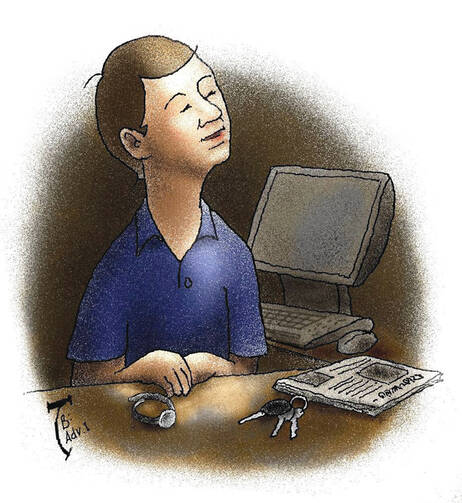Daily Distractions
Pope Francis said, on World Environment Day, June 5, 2013: “We are losing the attitude of wonder, contemplation, listening to creation. The implications of living in a horizontal manner [is that] we have moved away from God, we no longer read His signs.” He was referring to the physical environment, but he links the lack of awareness of our physical surroundings, nature and the human milieu to inattentiveness and distraction concerning the spiritual world. If we do not attend carefully to the things of this world, including ourselves, we lose sight of God.
During Advent we need to refocus our spiritual attention. One way we can do this is to gently question our need for instant gratification and quick answers in all areas of life. How many of us today are bound by our smartphones, responding thoughtlessly by reaching for our phone whenever we hear e-mail or direct message tings, regardless of what we are doing or with whom we are talking? Our devices follow us everywhere, not allowing us time to think or reflect.
We are losing the sense of wonder and contemplation, unable to read the signs of the times because of distractedness. This has an impact on our prayer, sense of community and family, and spiritual reflection. Distraction has permeated our daily lives so completely that intellectual, spiritual and emotional focus can no longer be taken for granted. Distractedness does not allow us to wait; it does not allow for patience, for it wants what it wants now.
Constant access to information and sources of knowledge is not a substitute for wisdom. It can, however, draw us into the mire of minutiae, away from real thinking, wonder and contemplation, and lead us to ignore our need to wait patiently to be prepared to encounter Christ. Patient waiting is neither distracted nor empty behavior. Patient waiting allows us to contemplate our lives and consider how we will prepare to greet the coming of Christ during Advent, to wonder about the signs of God and what they are speaking to us, to listen attentively to Scripture and what it is saying in the church and in the world.
We need to adopt an internal quiet to wait with and for Jesus. Before his arrest and crucifixion, Jesus taught his disciples how to wait patiently for his return by means of a parable. He taught them to “Beware, keep alert; for you do not know when the time will come.” This is not an instruction to anxiety, but guidance on attentiveness. The instructions for waiting on Christ are outlined in the parable. The slaves were asked to take charge of the household, “each with his work,” and the doorkeeper was commanded “to be on the watch.” The household is asked to continue its work and its daily routines with their minds attuned to when the master would return. Jesus calls for vigilance.
In the final part of the image, Jesus instructs his disciples: “Therefore, keep awake—for you do not know when the master of the house will come, in the evening, or at midnight, or at cockcrow, or at dawn, or else he may find you asleep when he comes suddenly. And what I say to you I say to all: Keep awake.”
“Keep awake” is not about sleep, but about spiritual torpor, which in our day manifests itself often as busyness in the form of distractedness. Distractedness is a way of not paying attention to oneself or the needs of others or the voice of God because we are so busily doing nothing. Being awake when the Messiah arrives depends upon our ability to wait quietly and to be aware enough to recognize Christ when he comes. To wait for Christ patiently demands active attention. The prophet Isaiah says, “There is no one who calls on your name, or attempts to take hold of you.” But how can one call on someone they no longer know? The difficulty today is not necessarily that people reject Christ, but that they are not awake and attentive to the signs reminding us that the Messiah is coming.
This article also appeared in print, under the headline “Daily Distractions,” in the November 24, 2014, issue.








